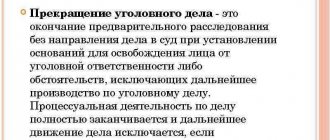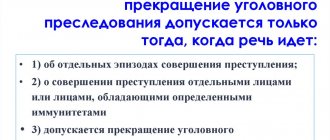New edition of Art. 21 Code of Criminal Procedure of the Russian Federation
1. Criminal prosecution on behalf of the state in criminal cases of public and private-public accusations is carried out by a prosecutor, as well as an investigator and an inquiry officer.
2. In each case of detection of signs of a crime, the prosecutor, investigator, body of inquiry and interrogating officer take the measures provided for by this Code to establish the event of a crime, to expose the person or persons guilty of committing the crime.
3. The head of the investigative body, the investigator, as well as with the consent of the prosecutor, the inquiring officer in the cases provided for in part four of Article 20 of this Code, are authorized to carry out criminal prosecution in criminal cases regardless of the will of the victim.
4. Requirements, instructions and requests of the prosecutor, head of the investigative body, investigator, inquiry body and interrogator, presented within the limits of their powers established by this Code, are mandatory for execution by all institutions, enterprises, organizations, officials and citizens.
5. The prosecutor has the right, after initiating a criminal case, to conclude a pre-trial cooperation agreement with the suspect or accused.
Commentary on Article 21 of the Code of Criminal Procedure of the Russian Federation
1. The principle of publicity enshrined in the commented article permeates all stages of the criminal process and applies to all bodies (officials) carrying out the criminal process, with the exception of the court and the judge <131>. ——————————— <131> See: Resolution of the Constitutional Court of the Russian Federation of January 14, 2000 N 1-P “In the case of checking the constitutionality of certain provisions of the Criminal Procedure Code of the RSFSR regulating the powers of the court to initiate criminal case, in connection with the complaint of citizen I.P. Smirnova and the request of the Supreme Court of the Russian Federation” // Collection of legislation of the Russian Federation. 2000. N 5. Art. 611.
2. At the stage of initiating a criminal case, the investigator (inquiry officer, etc.) is obliged to accept, consider and resolve the application (report) about any crime <132>. After initiating a criminal case for a crime not under investigation, he must carry out urgent investigative actions and only after that forward the case to the body competent to complete the preliminary investigation into it. ——————————— <132> An exception to this rule are cases where the legislator has granted the right to conduct an inspection of a statement (report) of a crime and initiate a criminal case against a specific official to a strictly defined preliminary investigation body. For example, according to the requirements of Part 1 of Art. 29 of the Federal Law “On the Investigative Committee of the Russian Federation”, investigators of internal affairs bodies cannot verify reports of offenses committed by an employee of the Investigative Committee of the Russian Federation, initiate a criminal case against them (except for cases when such an employee is caught committing a crime), carry out investigation.
3. The competence of the bodies of inquiry in Art. 157 of the Code of Criminal Procedure is limited by the legislator to a certain category of incidents. The relevant bodies of inquiry, heads of the body of inquiry, heads of inquiry departments and investigators do not have the right to initiate a criminal case that is not within their jurisdiction. For example, the commander of a military unit cannot initiate a criminal case about an incident that was not committed, firstly, by a subordinate serviceman or a citizen undergoing military training (a member of the civilian personnel of the Armed Forces of the Russian Federation, other troops, military formations and bodies in connection with with the performance of his official duties), and secondly, in the location of the military unit.
4. If any body of inquiry receives a statement (report) about a crime not within its jurisdiction, the investigator accepts the statement (report) (Articles 141, 144 of the Code of Criminal Procedure of Russia), registers it and forwards it according to jurisdiction. In this case, he is obliged to take measures to preserve traces of the crime.
5. On behalf of the state in criminal cases of public and private-public prosecution, criminal prosecution can be carried out not only by the prosecutor, investigator, interrogator, but also by:
— body of inquiry (clause 11, 24, article 5, part 2, article 21 and other articles of the Code of Criminal Procedure of Russia);
— head and members of the investigation team (Article 163 of the Code of Criminal Procedure of Russia);
- head of the investigative body (clauses 47, 55, article 5, article 39 of the Code of Criminal Procedure of Russia);
- head of the inquiry body (parts 3 and 4 of Article 41, Article 225 of the Code of Criminal Procedure of Russia);
— head of the investigation unit (Article 40.1 of the Code of Criminal Procedure of Russia);
- head of a group of investigators (Article 223.2 of the Code of Criminal Procedure of Russia).
6. The investigator (inquiry officer, etc.) not only has the right, but also the obligation to carry out criminal prosecution on behalf of the state. The imposition of such an obligation on him by the legislator is one of the guarantees of the mandatory implementation of criminal prosecution for most crimes. The presence of the duty in question distinguishes it from other entities empowered to carry out criminal prosecution, namely: from the private prosecutor, the victim, his legal representative and representative, the civil plaintiff and his representative.
7. According to the content of the provisions enshrined in the commented article, during the preliminary investigation, the investigator (inquiry officer, etc.), taking into account the requirements of investigative jurisdiction, must take all possible measures to solve the crime and prove the presence or absence of circumstances to be proven.
8. Exceptions to the principle of publicity are the provisions of Art. Art. 23, 25 of the Code of Criminal Procedure, the procedure for resolving applications for crimes listed in Art. 20 of the Code of Criminal Procedure, as well as consideration of cases of private (private-public) prosecution (see also the commentary to Articles 20, 23, 25 of the Code of Criminal Procedure of Russia).
9. According to part 4 of the commented article, the requirements, instructions and requests of the investigator (inquiry officer, etc.), presented within the limits of their powers established by the Code of Criminal Procedure, are mandatory for execution by all institutions, enterprises, organizations, officials and citizens.
10. Just as in the previous parts of the commented article, part 4 enshrines an idea that should apply not only to the persons indicated in it, but also to the demands, instructions and requests of the head and member of the investigative group (group of investigators), the head of the unit inquiry and the head of the inquiry body.
11. In cases of failure by participants in criminal proceedings to comply with the specified requirements, instructions or requests, violators may be subject to a monetary penalty of up to 2,500 rubles. in the manner established by Art. 118 Code of Criminal Procedure (Article 117 Code of Criminal Procedure of Russia).
12. Failure to comply with legal requirements may entail other forms of liability. Thus, a witness summoned by an investigator (inquirer, etc.), but who does not appear for questioning without a good reason, may be subjected to forcible bringing by the body of inquiry (internal affairs body) on the basis of a resolution of the official in charge of the criminal case, and the one who violated the requirements of the preventive measure may be subjected to the most stringent of the general arsenal of such measures. For some actions related to failure to comply with the requirements of the body conducting the proceedings, criminal liability is provided for (for example, for a witness’s refusal to testify; the victim’s evasion from undergoing an examination, from proceedings regarding his forensic examination in cases where his consent is not required, or from providing samples of handwriting and other samples for comparative research; for embezzlement, alienation, concealment or illegal transfer of property subject to inventory or seizure, committed by a person to whom this property was entrusted <133>, for carrying out banking transactions with funds by an employee of a credit institution ( deposits) that have been seized). ———————————
Note:
Commentary on the Criminal Procedure Code of the Russian Federation B.T. Bezlepkina is included in the information bank according to the publication - Prospect, 2012 (11th edition, revised and expanded). <133> See: Bezlepkin B.T. Commentary on the Criminal Procedure Code... P. 35.
13. The Code of Administrative Offenses of the Russian Federation provides for administrative liability for deliberate failure to comply with the demands of the prosecutor arising from his powers established by federal law, as well as the legal requirements of the investigator and interrogator (Article 17.7 of the Code of Administrative Offenses of the Russian Federation).
14. Requirements, instructions and requests of the investigator (inquiry officer, etc.), presented within the limits of their procedural powers, are mandatory for execution by all legal entities and individuals, regardless of what purpose they pursue as provided for in the Code of Criminal Procedure. The inclusion of this requirement in the article called “The obligation to carry out criminal prosecution” should not be interpreted as meaning that these requirements, instructions and requests can only be used for the purpose of incriminating a suspect accused of committing a crime. They can (and should) be used to protect the rights and legitimate interests of individuals and organizations who have suffered from crimes, as well as individuals from illegal and unfounded accusations, convictions, and restrictions on their rights and freedoms. This is not directly stated in the commented article, but such a conclusion can be drawn based on what is enshrined in Art. 6 of the Code of Criminal Procedure for the purpose of criminal proceedings <134>. ——————————— <134> See: Commentary on the Criminal Procedure Code... M.: Exam XXI, 2002. P. 64 - 65.
15. In Part 5 of the commented article, a prosecutor is understood as a prosecutor who oversees compliance with the laws by the bodies carrying out the preliminary investigation.
16. The prosecutor of Part 5 of the commented article is given not just the opportunity to enter into a pre-trial cooperation agreement. The legislator did not place this right in Art. 37 of the Code of Criminal Procedure, which regulates the status of the prosecutor, and in Art. 21 of the Code of Criminal Procedure, which combines legal provisions regarding the obligation to carry out criminal prosecution. Accordingly, part 5 of this article indicates not so much an expansion of the status of the prosecutor, but rather a different representation of his responsibility for criminal prosecution on behalf of the state in criminal cases of public and private-public prosecution.
17. At the same time, the legislator once again draws the attention of the law enforcement officer to the fact that a pre-trial agreement on cooperation cannot be concluded until a decision has been made to initiate a criminal case, and that such an agreement can only be concluded with a suspect or accused.
18. Nothing is said here about the defender of the suspect (accused). I think this is not an omission of the legislator, but his principled approach. The prosecutor enters into a pre-trial cooperation agreement not with the defense lawyer, but with his client. The role of the defense attorney is to ensure compliance with the legal rights and interests of the suspect (accused) when concluding the required agreement. That is why the legislator requires in Art. 317.3 of the Code of Criminal Procedure, draw up a pre-trial cooperation agreement with the participation of a defense attorney, who signs it together with his client.
19. See also commentary to Art. Art. 5, 39, 73, 144, 157, 317.3 Code of Criminal Procedure <135>. ——————————— <135> For a more complete commentary on this article, see: Ryzhakov A.P. Duty to carry out criminal prosecution. Commentary on Article 21 of the Code of Criminal Procedure of Russia. M., 2002.
Another comment on Art. 21 Criminal Procedure Code of the Russian Federation
1. The fundamental novelty of Part 1 of the commented article is that now the law clearly states: along with the prosecutor, criminal prosecution in cases of public and private-public accusations is carried out by the investigator and the interrogating officer.
2. Part 2 of the commented article expresses the public principle inherent in Russian criminal proceedings. It lies in the fact that most criminal cases are initiated due to the obligation of the authorities carrying out criminal prosecution, and not at the discretion of the injured party, and are not subject to termination after reconciliation of the parties, except for cases specifically specified in the law. The public beginning of the Russian criminal process is also expressed in the fact that the investigator, as well as the interrogating officer, with the consent of the prosecutor, have the right to initiate any criminal case of private and private-public prosecution (see Part 4 of Article 20 of the Code of Criminal Procedure of the Russian Federation and the commentary thereto), without regard to with the will of the victim.
3. Carrying out the function of criminal prosecution in many cases is impossible without the use of criminal procedural coercive measures. The legal requirements of the body carrying out criminal prosecution (prosecutor, investigator, inquirer), presented within the competence provided by the criminal procedure law, are mandatory for execution by all institutions, enterprises, organizations, officials and citizens. Failure to comply will result in the use of coercive measures. For example, a witness who fails to appear for questioning without a good reason may be subject to arrest, and someone who violates the requirements of a preventive measure may be subjected to a more stringent measure of restraint. For some actions related to failure to comply with the requirements of the body carrying out criminal prosecution, criminal liability is provided (for example, for the refusal of a witness to testify).
AZ-libr.ru
Article 21. Responsibility for criminal prosecution 1. Criminal prosecution on behalf of the state in criminal cases of public and private-public accusations is carried out by the prosecutor, as well as the investigator and interrogating officer. 2. In each case of detection of signs of a crime, the prosecutor, investigator, body of inquiry and interrogating officer take the measures provided for by this Code to establish the event of a crime, to expose the person or persons guilty of committing the crime. 3. The prosecutor, in the cases provided for in part four of Article 20 of this Code, is authorized to carry out criminal prosecution in criminal cases regardless of the will of the victim. 4. Requirements, instructions and requests of the prosecutor, investigator, inquiry body and interrogating officer, presented within the limits of their powers established by this Code, are mandatory for execution by all institutions, enterprises, organizations, officials and citizens.Comm. Bogolyubova T.A.
1. Having a clearly defined imperative nature, the commented article provides an exhaustive list of persons and bodies that are authorized by the state to carry out criminal prosecution. No one other than the prosecutor, the head of the investigative department, the investigator and the inquiry officer can carry out criminal prosecution on the territory of the Russian Federation. Let us note that in the Code of Criminal Procedure of the Russian Federation the court is excluded from the list of participants authorized to carry out criminal prosecution, which corresponds to the principle of adversarial behavior of the parties proclaimed by the new criminal procedure legislation (see commentary to Article 15 of the Code of Criminal Procedure of the Russian Federation). 2. Corresponding to the concept of criminal prosecution is the function of the prosecution, the implementation of which is assigned to the prosecutor, the head of the investigative department, the investigator and the interrogating officer. The implementation of this function involves the collection, research and assessment by the subjects of criminal prosecution of evidence that not only incriminates, but also exonerates the suspect accused of committing a crime. This understanding and interpretation of the function of the prosecution corresponds to the fundamental principles of the criminal procedure of the Russian Federation, enshrined in Articles 11 and 14 of the Code of Criminal Procedure of the Russian Federation (see the commentary on these articles), as well as the provisions of Article 73 of the Code of Criminal Procedure of the Russian Federation, which directly names the circumstances that exclude crime and Punishability of acts, mitigating punishment (see commentary to this article). 3. In each case of discovery of signs of a crime, the prosecutor, investigator, body of inquiry and interrogating officer are obliged to take the measures provided for by the Code of Criminal Procedure of the Russian Federation to establish the event of a crime and expose the person (persons) guilty of committing them. 4. Part 3 of Art. of the commented article authorizes the prosecutor to carry out criminal prosecution in cases of private and private-public accusations, regardless of the will of the victim, if he is in a dependent state on the person who committed the crime, or when for other reasons he is not able to independently use the property his rights (see commentary to Article 20 of the Code of Criminal Procedure of the Russian Federation). 5. Part 4 of Article 20 provides for cases when the exercise of the rights of the victim in cases of private and private-public prosecution is hindered by the circumstances and reasons listed in the law. In such situations, in accordance with the provisions established by the Constitution of the Russian Federation (Articles 2, 45, 46), the prosecutor, investigator and inquiry officer, with the consent of the prosecutor, have the right to initiate a criminal case without a statement from the victim. 6. The authority of the prosecutor, established by Part 3 of the commented article, to carry out criminal prosecution in this category of cases, regardless of the will of the victim and only in the presence of the circumstances listed in Part 4 of Article 20 of the Code of Criminal Procedure of the Russian Federation, ensures the proper exercise of the rights of the person against whom the crime was committed . It seems that the provisions of the new Code of Criminal Procedure have introduced significant innovations in the regulation of this issue. Earlier (see commentary to Article 20 of the Code of Criminal Procedure of the Russian Federation) it was said that there was a significant change in the list of circumstances allowing the prosecutor, investigator and interrogating officer to initiate a criminal case. Now it is important to note that it is the prosecutor who is authorized to prosecute in such cases. At the same time, it cannot be denied the prosecutor’s right to transfer the case to an investigator or inquiry officer to conduct an investigation in such cases in full and in accordance with the requirements of this Code of Criminal Procedure (see commentary to Article 37 of the Code of Criminal Procedure of the Russian Federation). The wording used in Part 3 of the commented article “regardless of the will of the victim” means that criminal prosecution in cases of private and private-public charges initiated in accordance with the requirements of Part 4 of Article 20 of the Code of Criminal Procedure of the Russian Federation is carried out by the prosecutor. 7. Part 4 of the commented article contains an important rule ensuring the execution by the prosecutor, investigator, investigative agency and interrogator of the powers of criminal prosecution. According to this provision, all institutions, enterprises, organizations, officials and citizens are obliged to comply with the requirements, instructions and requests of the prosecutor, investigator, inquiry agency and interrogator. 8. A mandatory requirement for such requests from the prosecutor, investigator, inquiry agency and interrogating officer is their compliance with the limits of authority established for each of them by the Code of Criminal Procedure of the Russian Federation. The powers of the prosecutor are established by Article 37 of the Code of Criminal Procedure of the Russian Federation, of the investigator - by Article 38 of the Code of Criminal Procedure of the Russian Federation, of the body of inquiry - by Article 40 of the Code of Criminal Procedure of the Russian Federation, by the investigator - by Article 41 of the Code of Criminal Procedure of the Russian Federation (see commentary to the relevant articles). 9. Requirements, instructions and requests of the prosecutor, investigator, body of inquiry and interrogating officer, presented within the limits of their powers, regarding the provision of information related to state, commercial secrets and other information to which there is no free access, are subject to execution in the manner and within the limits established relevant laws of the Russian Federation. Thus, information constituting a commercial secret is provided to preliminary investigative bodies in cases under investigation with the consent of the prosecutor. The procedure for providing information related to bank secrecy is determined by federal legislation. The procedure for access to information constituting a trade secret is regulated by Article 139 of the Civil Code of the Russian Federation. 10. The law has not established the form and procedure for processing demands, instructions and requests, which allows us to consider any form of appeal (both written and oral) mandatory. At the same time, for some instructions written form is required (see appendices 45 and 46 to Article 476 of the Code of Criminal Procedure of the Russian Federation). 11. Requirements and instructions, the execution of which is related to the implementation of actions of a legal nature (an instruction to interrogate a witness living in another region, a requirement to conduct an audit, etc.) must be drawn up in writing. Other requests for information submitted within the powers of the investigator or interrogating officer for the crimes they are investigating can be made in writing, or can be transmitted orally (for example, by telephone message).




